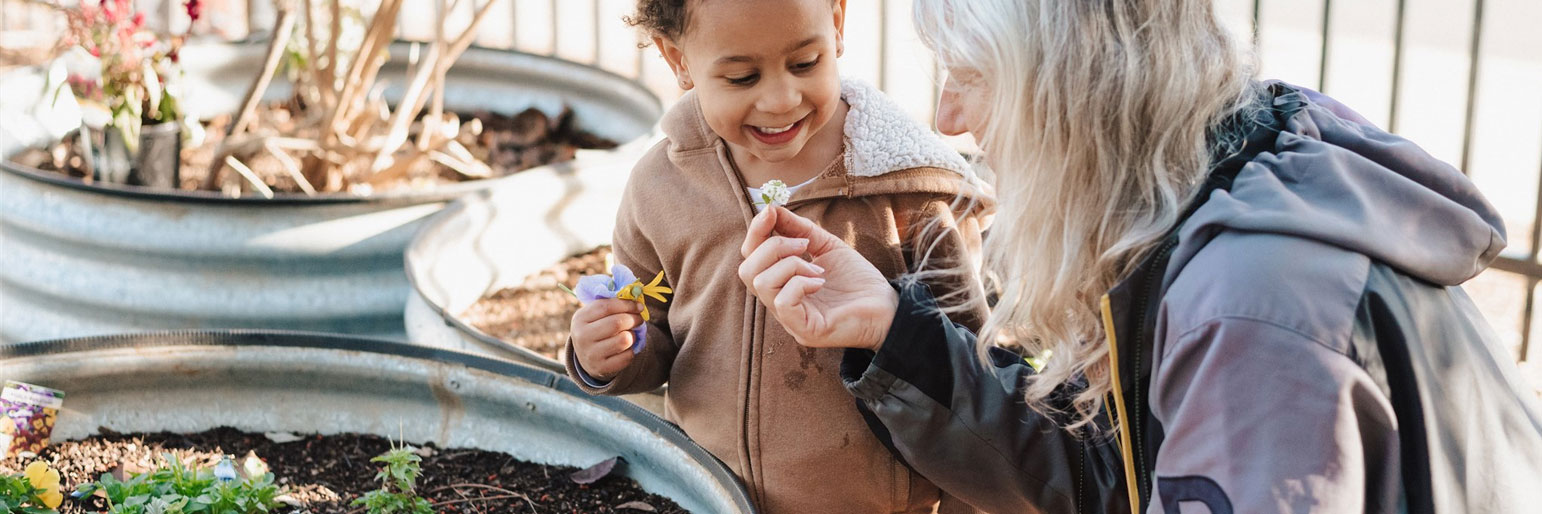Nature collecting walk
Looking together
Collecting ‘treasures’ from nature can give a child a sense of sentimental value and connection to the natural world. Walking in nature is also a great way to encourage active play.

Activity
A nature collecting walk is simply picking up little bits and pieces you can find outside without disturbing the natural ecosystem. This may include leaves, flowers, twigs, stones, feathers.
It can happen around the yard, a walk together up the street or on the way to or from playgroup.
This can be as simple as you want to make it... you don’t need to take a thing. It’s a great idea for playgroup as it is easy to do and can be done spontaneously.
Parents/carers can talk to the children about things they may find along the way or ask them what they would like to search for.
It’s a lovely opportunity to be together, have a chat and notice what’s around us.
Children may like to collect little objects while they walk or may just like to look and notice.
What you'll need
There are different ways of doing a collecting walk, you could:
- Make it simple and just collect as much as you can fit in your hands.
- Take a bucket or basket to carry the collection in.
- Put a strip of masking tape around each child’s wrist so the sticky side is outside, collecting things to put on the wrist band.
Optional extras:
- magnifying glasses
- binoculars
- tongs or a scoop for picking things up
- camera for things that can’t be collected.
Words to use
- Flower, bud, petal
- Soft, scented, smell, pretty
- Pink, yellow, blue, green
- Trees, leaves, move, sway, breeze
- Sun, shadow, dappled, sunlight
- Colours, changing, turning
- Soft, crispy, crumbly
- Cool, cold, windy, rainy
- Clouds, sun, sky
Questions to discuss
- Can you feel the grass underneath your feet?
- Are you looking at the sky? What can you see?
- Can you hear the birds singing?
- What else can you hear?
Learning through play
Ways to develop numeracy through play
- With the collections, children may sort, group and organise.
- Talk about patterns in nature and our world.
- Look out for numbers in the environment, eg on letterboxes.
- Make size comparisons of different objects.
- Talk about weight – which rock feels heavier/lighter.
- Count how many...
- Make a graph to record what you find.
- Estimate and make predictions about what you might find.
Ways to develop literacy through play
- Talk with children as you go on your walk about the things you see.
- Use lots of adjectives to describe what you find.
- Make comparisons and talk about opposites.
- Talk about all the different parts of plants that you find (roots, stem, leaves, flowers).
- Talk about colours and hues.
- Talk about the weather.
- Talk about the seasons and changes that you notice.
- Read signs and environmental print.
- Make a book about your walk.
Extensions and variations to this activity
- Have glue and paper on the table for children to make collages with their findings.
- Make a nature crown by gluing or sticking items that you find on a cardboard crown shape.
- Add items to the looking table with magnifying glasses.
- Add items to the playdough table – make a playdough garden on a paper plate or plastic cup.
- Add items such as pinecones, gumnuts, sticks, wood rounds or bark to the construction area.
- Glue or paint on bark or other natural objects such as rocks or pinecones.
- Suggest to families they try a nature walk around their home, or the beach, park, etc.
Supporting parent engagement in play
Play prompts:
Ask questions, like:
- What do you think we’ll find today?
- What can you see?
- Look, can you see the...?
Parents or carers can:
- Comment on what their children are doing (say what they see).
- Talk in their home language.
- Use literacy and numeracy words (see words to use section above).
- Comment on what they notice the child exploring – “Oh, you found some leaves! You are seeing how they crunch and crumble in your hand”.
- Extend the child’s interest, by talking about what they find.
- Help children to extend their ideas, by providing a basket for collections, a camera for a photo, or taking them to the library to find more information.
- Extend the child’s interest by adding some sensory words.
You can help families by:
- Modelling what you want them to do.
- Talking to them about the focus of the activity and what children might be learning.
- Writing up words that go with the activity.
- Making suggestions on what families can do at home.
Related Great Start activities
Great Start activities are for parents and carers to do with their children.


